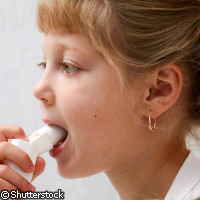Study shows steroids don't help childhood wheezing
Steroid treatment is routinely given to asthma sufferers and can be vital during an attack, but it is often controversially given to pre-school children suffering from wheezing when they have a cold or flu. A new study suggests that this practice does not work; alternative treatments should be explored, especially since steroids can have serious side effects in children. The study, funded by the charity Asthma UK and published in the New England Journal of Medicine, was carried out by researchers from Britain's University of Nottingham and Barts and London School of Medicine and Dentistry. Its aim was to find out whether wheezing symptoms in children under the age of five, who are simply suffering from the effects of colds and flu, are helped by taking steroid tablets. Steroid treatment is important in treating children with asthma-induced symptoms, but giving steroid treatment to pre-school children suffering from virus-induced wheezing is a controversial area of medicine. The results of the survey showed that giving steroid tablets to children who wheeze when they have a cold is not effective. Dr Alan Smyth, Associate Professor and Reader in Child Health at the University of Nottingham, who worked on the study, said: 'There may be some children, for example those with a family history of asthma, who benefit. However, young children who wheeze when they have a viral infection do not seem to be helped by steroids.' Many asthma sufferers take steroid treatment for many years. But taking steroids over long periods of time can have serious side effects for many asthma sufferers, such as stomach ulcers, thinning of the bones, an increased tendency to bruise easily, weight gain, cataracts in the eyes and slowing of growth in children. Dr Monica Lakhanpaul, a paediatrician from the University of Leicester, who also participated in the study, said: 'A number of treatments are used in children without strong evidence. This study demonstrates the need for further research in children not only to help us to find out treatments that work but also those that do not work which will then open the way to new research. It is sometimes difficult to recruit children to research studies but this study has been strongly supported by the families and children in the East Midlands and will help us to move another step closer to helping these children who suffer from wheeze.' For his part, Dr Mike Thomas, chief medical adviser for Asthma UK, welcomed the results of the study and said it could have important implications. 'Young children who only get wheezy when they have a cold or viral chest infection but can breathe normally at other times, are likely to grow out of their tendency to wheeze by teenage years. It is important that we stop relying on a one solution fits all which means that these young children are taking steroids unnecessarily and to search for more effective treatments for these children.' The UK has the highest rates of asthma in Europe, almost double the EU average of 7.2%; 1,500 people die from it every year and cases among young people are currently 6 times higher than they were 25 years ago.
Countries
United Kingdom



